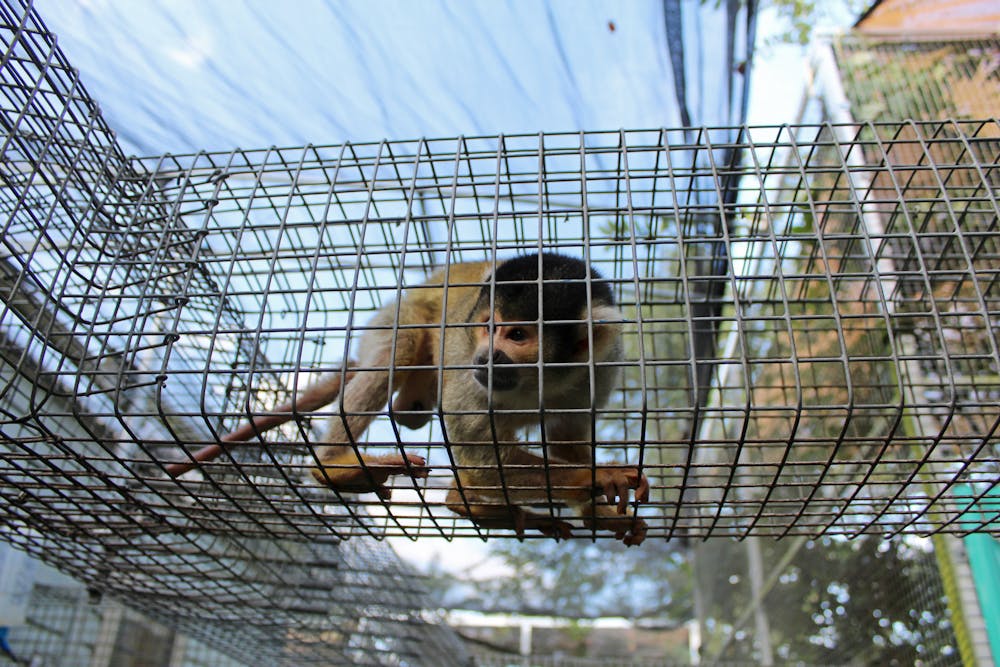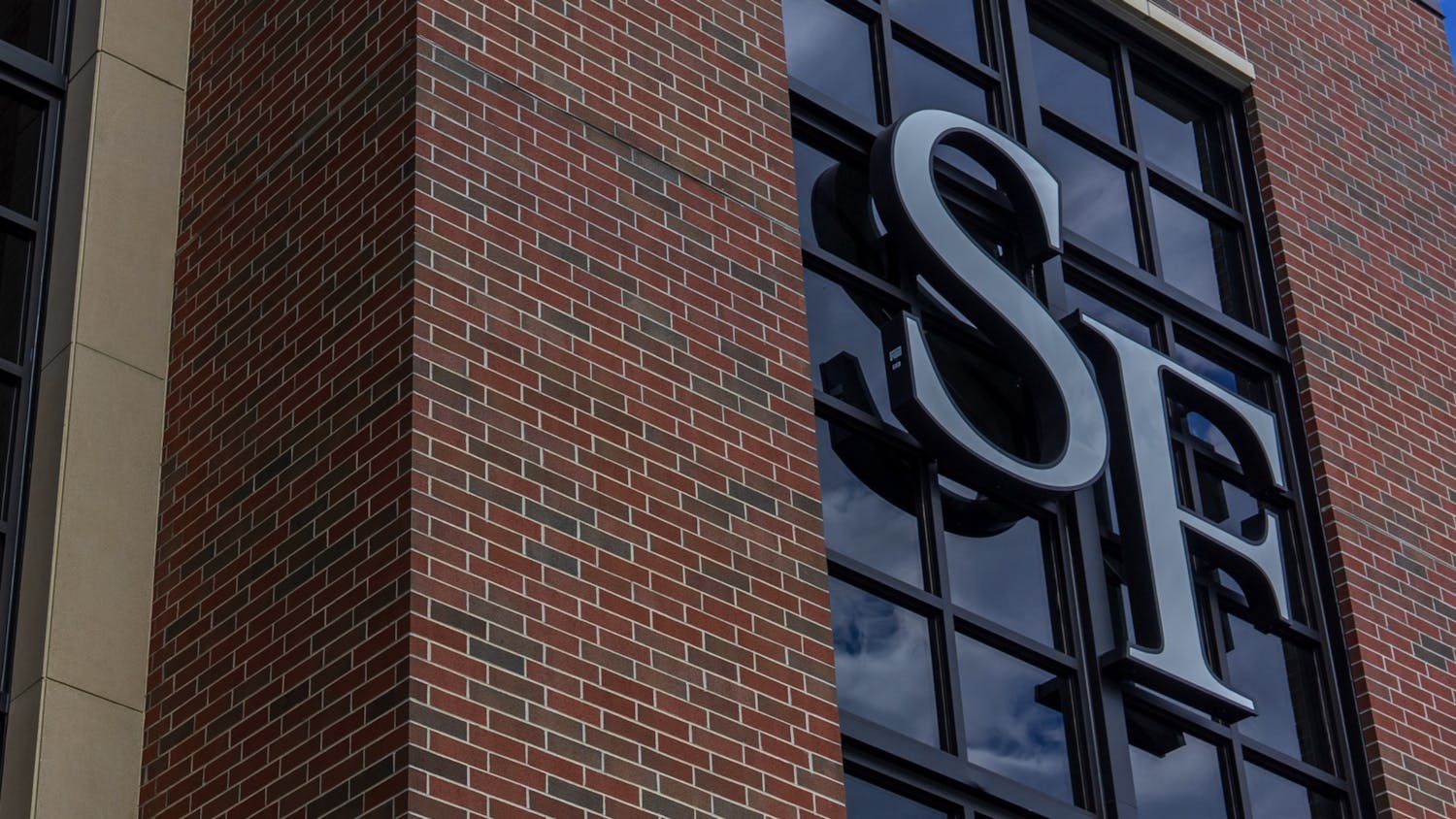Rays of sunlight beamed into a cage, illuminating the trimmed vegetation and the painted metal bars of two monkeys’ renovated habitat.
The enclosure, filled with logs and leafy vines, was a new home for Mike and Molly. The pair of black-handed spider monkeys now live at Jungle Friends Primate Sanctuary, a non-profit sanctuary that cares for retired lab research monkeys, ex-pets and monkeys confiscated by authorities.
The primate sanctuary has a number of refurbished enclosures boasting new play equipment for the monkeys, but it wasn’t always like this.
In July, the sanctuary faced potential shutdown after an inspection revealed seven violations of animal safety requirements.
The report listed six non-critical violations and one direct violation of the American Welfare Act’s requirements for veterinary care.
A consulting veterinarian didn’t inform owner Kari Bagnall and Dr. Bobby Collins, the attending veterinarian, about a controlled substance prescribed to one of the monkeys. The critical violation was linked to employees not knowing when to contact the attending or consulting veterinarians, Bagnall said.
The inspection report also detailed an accumulation of feces in the enclosures, insect infestations, expired medications, rusty cages, understaffing and overgrowth that attracted pests and vermin.
Jungle Friends, located at 13915 N State Road 121, was given until Sept. 24 to improve its conditions, but authorities extended the deadline. Bagnall said she didn’t know the new deadline, and the U.S. Department of Agriculture couldn’t be reached to confirm the date. Authorities inspected the sanctuary after complaints from former employees and volunteers about the rough conditions primates endured.
The decline in the sanctuary’s condition was caused by an uncharacteristically rainy dry season that led to overgrowth, Bagnall said. Understaffing was also exacerbated by the COVID-19 pandemic.
The sanctuary raises funds through private donations and tourists who visit through an Airbnb experience program. Since the pandemic, the sanctuary has lost more money than it has brought in, Bagnall said. She has used Paycheck Protection Program loans to ensure staff gets paid.
“We’re trying to get more people interested, but it’s really hard,” Bagnall said. “People are in trouble. Everyone’s in trouble right now. It’s just a weird situation.”
When the initial Sept. 24 deadline arrived, Bagnall said the sanctuary still had a lot of work to do across the 150 habitats home to more than 250 primates.
The sanctuary, Bagnall said, has since streamlined communication between attending veterinarian Collins and the consulting veterinarians: Dr. Fred Schirmer at West End Animal Hospital and Dr. Darryl J. Heard at UF.
Food storage rooms are now clean and organized, Bagnall said. There have been no insect or pest issues since the sanctuary has implemented stringent daily cleaning duties.
Sara Smith, a volunteer of more than 20 years, said employees now rake food waste every day and clean out fecal matter weekly.
The overgrowth has been cut back in some enclosures, which allows for employees to ensure overall cleanliness and see whether rodents or snakes sneak in, Smith said. Monkeys have been moved out of overgrown enclosures that still need to be refurbished.
The sanctuary has doubled its staff to 12 members since the USDA investigation began. She aims to have 25 employees within the next year.
Bagnall said she fired several staff members after the inspection for slacking on cleaning duties, neglecting to check expiration dates and not communicating with the rest of the staff.
In search of a more dependable staff, Bagnall has implemented a paid working interview process in which candidates complete up to eight days of on-site duties to determine if they’re suitable for the position. The prospective employees, however, aren’t required to have prior experience with monkeys.
Lenny Finnegan, a landscape maintenance employee, left his position as a car mechanic to work for Jungle Friends two-and-a-half months ago.
Finnegan, who has refurbished around 20 to 30 habitats, said it’s difficult to complete all needed maintenance each day. He often has to take on different roles because there aren’t enough employees.
“Getting some of my habitats cleaned up and getting things moved around, that's where more hands would help so I wouldn't have to come off and go from maintenance to caregiver,” he said. “But we're getting there.”
Marie Finnegan, a monkey caregiver at the sanctuary, noticed a big change in the monkeys’ behavior since the sanctuary began its cleanup. The animals appear happier, she said, and staff has collaborated better than before.
“We have been working our booties off,” she said. “Sunrise to sundown, making sure that this is getting done. We want to make sure that they're happy and that they're safe.”
Lora Lattimer was hired a month ago and said despite the issues, the monkeys are treated better than the humans.
“[Kari] took it upon herself that there was a need, and she rescued these monkeys,” she said. “She’s not the problem. Kari’s the solution.”
The USDA and Florida Fish and Wildlife, the two investigating agencies, haven’t provided comment on the most recent inspection of Jungle Friends. The authorities will conduct a courtesy visit Nov. 3 in which they will outline unresolved issues and how they should be addressed.
Contact Bryce at bbrown@alligator.org. Follow him on Twitter @brycebrownnn.
Bryce Brown is a third-year journalism major and copy editor for The Alligator. He has previously worked as a metro general assignment reporter on the Metro desk and as staff writer for The Avenue. When he's not fretting over deadlines, you can find him drinking copious amounts of black iced coffee and listening to Lana Del Rey.






